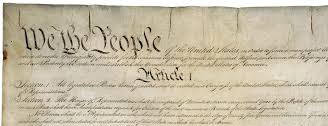It was established in the 2019 Supreme Court case Rucho v. Common Cause that the federal courts cannot interfere with partisan gerrymandering. But what about state courts? At the moment, yes, a state court can rule that the way district lines have been drawn violates the equal protection provisions of the state’s own constitution. But, where the drawing of congressional districts is concerned, that may be about to change.
Article I Section 4 of the Constitution says:
The Times, Places and Manner of holding Elections for Senators and Representatives, shall be prescribed in each State by the Legislature thereof; but the Congress may at any time by Law make or alter such Regulations, except as to the Places of chusing Senators.
Does that passage mean that the legislature can do whatever it wants, and state courts can’t interfere? Or is the state legislature subject to the same checks and balances for the acts it passes concerning congressional elections that it’s subject to for all other kinds of legislation? If the former is correct, it means that the majority party in the legislature can vote to gerrymander the hell out of the state’s congressional districts and no state court can interfere.
The Supreme Court has agreed to hear the case of Moore v. Harper, from North Carolina, in the coming season. What’s involved is that after North Carolina’s legislature approved a map for congressional districts in that state, a state court ruled that the gerrymandering that went into that map violated the state’s constitution. The state court appointed an independent committee to draw up a new map, and that map is being used for this year’s elections. Republican legislators tried in February to get the U.S. Supreme Court to issue an emergency order for a return to the map the legislature approved in time for this year’s elections. The Supreme Court refused, but three justices made clear that they were on the side of the North Carolina Republicans: Clarence Thomas, Samuel Alito, and Neil Gorsuch. It’s not clear where the other three conservatives stand; the three liberals can be expected to be on the side of the state court.
This relates closely to another issue that came up in the aftermath of the 2020 presidential election. Some members of Congress, in the January 6 debates, made the argument that when a state court orders an extension for consideration of mail-in ballots, the state court ruling is invalid, as are any ballots counted after the deadline that the state legislature has set. This draws on the passage in Article II Section 1, which begins “Each State shall appoint, in such Manner as the Legislature thereof may direct, a Number of Electors…” Here again, the argument being made is that the Constitution has granted the state legislatures exclusive authority over certain things, which means state courts have no jurisdiction to interfere.
This will be an important case to follow in the coming year.
Article in SCOTUSBLOG, June 30, 2022



